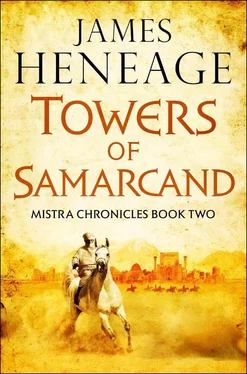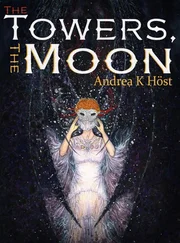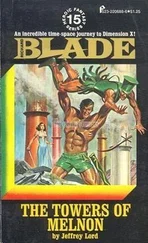James Heneage - The Towers of Samarcand
Здесь есть возможность читать онлайн «James Heneage - The Towers of Samarcand» весь текст электронной книги совершенно бесплатно (целиком полную версию без сокращений). В некоторых случаях можно слушать аудио, скачать через торрент в формате fb2 и присутствует краткое содержание. Год выпуска: 2014, Издательство: Heron Books, Жанр: Исторические приключения, на английском языке. Описание произведения, (предисловие) а так же отзывы посетителей доступны на портале библиотеки ЛибКат.
- Название:The Towers of Samarcand
- Автор:
- Издательство:Heron Books
- Жанр:
- Год:2014
- ISBN:нет данных
- Рейтинг книги:3 / 5. Голосов: 1
-
Избранное:Добавить в избранное
- Отзывы:
-
Ваша оценка:
- 60
- 1
- 2
- 3
- 4
- 5
The Towers of Samarcand: краткое содержание, описание и аннотация
Предлагаем к чтению аннотацию, описание, краткое содержание или предисловие (зависит от того, что написал сам автор книги «The Towers of Samarcand»). Если вы не нашли необходимую информацию о книге — напишите в комментариях, мы постараемся отыскать её.
The Towers of Samarcand — читать онлайн бесплатно полную книгу (весь текст) целиком
Ниже представлен текст книги, разбитый по страницам. Система сохранения места последней прочитанной страницы, позволяет с удобством читать онлайн бесплатно книгу «The Towers of Samarcand», без необходимости каждый раз заново искать на чём Вы остановились. Поставьте закладку, и сможете в любой момент перейти на страницу, на которой закончили чтение.
Интервал:
Закладка:
The door to the ger moved. Someone was trying to enter. Heads turned and people sat up. A child screamed. A demon was forcing its way inside.
The door opened and the girl stood in its frame covered in a single, stiff sheet of felt. She looked into the tent and her eyes were dull with cold and pleading. She was seeking shelter from the storm. Luke sat up.
Who are you?
Gomil rose and lifted an arm. A boot thudded against the door frame, then another. A third hit her on the side of the head and she lifted her arm to protect herself. She glanced around the tent and there was fear in the look and blood next to the bruise on her cheek. She found Luke and, for a second, held his gaze. Then she backed away, pulling the door shut behind her.
Luke got up and picked up a wolf skin, ignoring the cries of those who’d lain beneath. He stumbled to the door and pulled it open and the savagery of the night outside almost flung him back inside. He could see nothing beyond a swirling darkness that tore at his hair and clothes. He turned back and grabbed a torch from the wall, shielding its flame with his body. He moved out into the night, pulling the door shut. He turned his head to left and right and called and felt the sound thrown back at him on the wind. He jumped from the wagon into the snow and called again. There was no answer.
He heard a sound to his right. He felt his way along the side of the wagon, the torch held close within his cloak, the wolf skin balled against his stomach. Every step was a fight to stay upright. He stumbled against something, something alive and huddled against a wheel, something that moved quickly away when he leant forward to touch it. He bent and felt the tangled hair of the girl, crusted with snow. He moved his torch from within his cloak and, in its scattered light, he saw her.
A bare arm circled the neck of a horse. In her other hand was a knife. There was a cut in the skin of the animal’s neck where she’d opened a vein and blood ran from the corners of her lips. Luke recoiled. He pushed the skin at her and it was snatched from his hand. He looked again but there was nothing there. Nothing. She’d vanished into the storm.
*
A week later, they arrived, quite suddenly, at the valley. For the first time in weeks, Luke saw trees climbing the slopes up to the jagged teeth of an escarpment that ran as a high ridge on either side. Below the trees were fields, thick with snow, some of which had the shapes of old walls around them.
Further on, they met another valley that ran across theirs. A little river ran through it, outcrops of snow coasting on its currents like driftwood. They stopped to let the horses drink. Dried milk curds were produced from pockets and passed around and the men’s faces curved into smiles as they chewed. Luke looked around for the girl. There was no sign of her.
Soon they were on their way again and the going was easier. The men leant from their saddles to laugh while women climbed down from the wagons to walk with their children. The horses held their heads a little higher and the jangle of harness told of a journey’s end.
By the afternoon, they had reached a flat piece of ground where the river broke into separate paths that gurgled their way around islands on which large birds stood on one leg watching them. The men dismounted and looked around at the snow and filled their water bottles from the river, sweeping aside the ice with their hands.
Luke helped Arkal lift the bales of felt from the wagons and stretch out the frame of the ger. Together, they unrolled the layered felt and wrapped it around the latticed wall, securing it in place with ropes. The work was done in silence broken only by the barked command of Berta. The little boy helped by clearing snow from the ground and dragging the wooden flooring from the wagons. Occasionally he stopped to wipe his nose on the felt.
In less than an hour, the ger was up and Luke was helping Berta to hang the wooden door on its frame. Arkal had brought rugs from the horses and was arranging them on the floor. Then the sleeping pallets were brought in and the animal pelts, and after that came an old wooden chest and a range and utensils for making food. Soon the smell of cooking wafted up into the dusk and the tribe congratulated each other that another trek to their winter pastures had been made in safety.
Luke saw it all and felt a sense of foreboding. Winter was on its way and he was a stranger in a strange land among people who didn’t want him.
CHAPTER TWO
MISTRA, NEW YEAR 1397
Snow usually covered only the head and shoulders of Mount Taygetos. That year it came down from the mountain and into the Vale of Sparta and the wolves came with it. At night, the mothers of Mistra would put palms to their children’s ears to shut out their howling. Some said that the Milingoi would follow, that starving savages in animal skins would soon be climbing the city walls.
Inside the city, the streets were treacherous. People slid their way down to break the ice on wellheads and a donkey carrying food up to the citadel turned cartwheels. Monks prodded the ground of their little gardens for survivors and every morning the Despot checked the city’s stores for grain.
Anna Laskaris was just thankful that the snow would keep away the Turks.
From the balcony of the Laskaris house, she looked out over the Vale of Sparta and saw fields without movement, a frozen landscape of suspended windmills and skeletal trees. Birds screeched their hunger in a sky of hard blue and columns of smoke rose from the hearths of a hundred farmsteads. Anna remembered when it had been filled by a Turkish army, fifty thousand strong. She’d been fifteen then.
She looked down at the tall cedar tree in the courtyard and saw a girl of seventeen standing beneath it waiting for her father to ride through the gate with the boy who was to be her husband: Damian Mamonas. She saw herself then, unruly red hair as defiant as the mood beneath it, ready to do her duty by this marriage, to do it for Mistra, for Byzantium.
She watched a small bird, yellow and blue on its wings, swoop down to land on a stone engraved with a name and a date.
Alexis .
It was the stone from which her brother had mounted his horse for the last time, engraved by their father after his only son’s death. Alexis had fought and died trying to keep Mistra free. She was destined, instead, to marry for the Empire. First Damian. Now Suleyman. And not Luke.
She heard a sound behind her and turned. Her mother, Maria, was standing in the open doorway. She seemed much smaller these days.
‘You were looking at the tree, remembering when he came to get you.’
‘Yes, I was thinking about Alexis.’
Maria was silent for a while, then she said, without emotion, ‘You will be leaving soon.’
‘Why so?’
‘Because Suleyman will come for you shortly.’ She paused. ‘Will you marry him?’
Anna drew apart. She studied her mother, marvelling at her calm. ‘If I must, yes. The Empire requires it.’
Maria let out a long sigh. ‘First a husband, then a son. Now a daughter. The Empire is demanding.’
Anna remembered Zoe’s words in the chapel. This empire that devours its children . She had been right.
‘You could come and live with me. I’ll look after you.’
But her mother shook her head. ‘No. I’ll stay here. Mistra is my home.’
Anna hugged her. ‘And mine. I don’t want to leave.’
*
The Emperor Constantine had, ten centuries earlier, decreed that the Christian Christmas should be celebrated on the twenty-fifth day of December and that year in Mistra, Christmas Day and the twelve to Epiphany were a time of untrammelled celebration. The philosopher Plethon was there for the festivities, enlisting the services of Anna, some shepherds and the repaired donkey to stage a nativity play, written and narrated by himself. The Patriarch found himself playing Joseph.
Читать дальшеИнтервал:
Закладка:
Похожие книги на «The Towers of Samarcand»
Представляем Вашему вниманию похожие книги на «The Towers of Samarcand» списком для выбора. Мы отобрали схожую по названию и смыслу литературу в надежде предоставить читателям больше вариантов отыскать новые, интересные, ещё непрочитанные произведения.
Обсуждение, отзывы о книге «The Towers of Samarcand» и просто собственные мнения читателей. Оставьте ваши комментарии, напишите, что Вы думаете о произведении, его смысле или главных героях. Укажите что конкретно понравилось, а что нет, и почему Вы так считаете.












